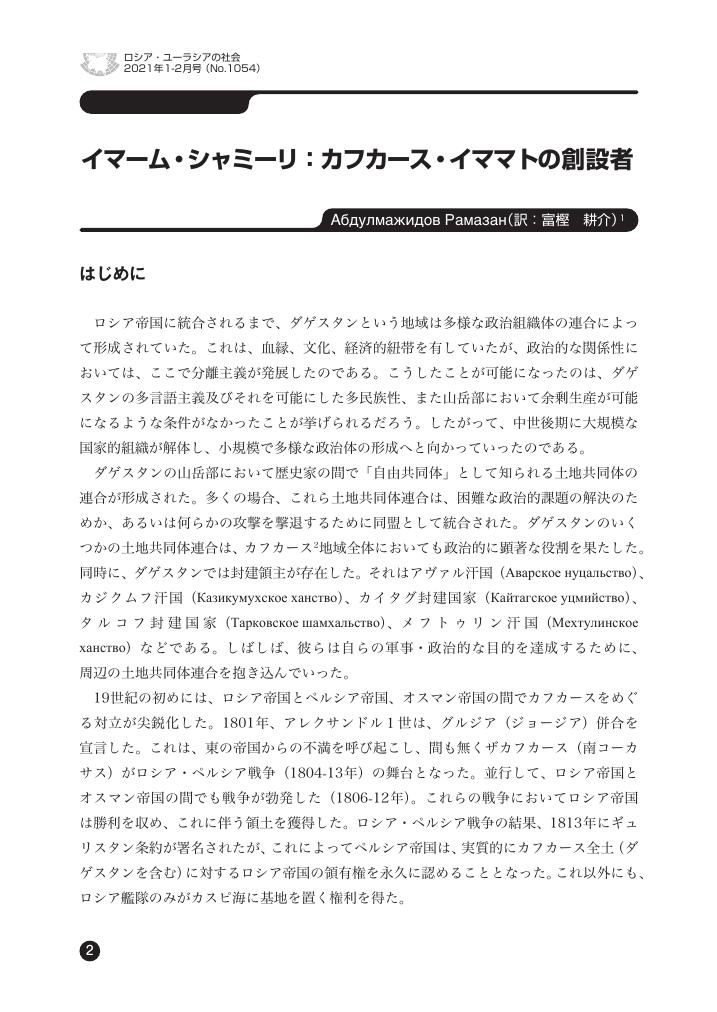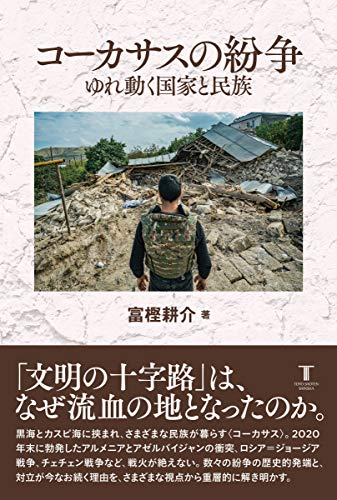2 0 0 0 OA イマーム・シャミーリ:カフカース・イママトの創設者
- 著者
- アブドゥルマジドフ ラマザン 富樫 耕介
- 出版者
- ユーラシア研究所
- 雑誌
- ロシア・ユーラシアの社会 (ISSN:24353191)
- 巻号頁・発行日
- vol.2021, no.1054, pp.2-14, 2021 (Released:2023-03-08)
- 著者
- 富樫 耕介
- 出版者
- ロシア・東欧学会
- 雑誌
- ロシア・東欧研究 (ISSN:13486497)
- 巻号頁・発行日
- vol.2018, no.47, pp.81-97, 2018 (Released:2019-10-08)
- 参考文献数
- 30
Chechnya is important in terms of issues related to the nature of the state and minorities in the Russian Federation. When considering the Chechen problem, one notices that it has a dual structure. First, as a minority in Russia, the Chechen people have been affected by changes in the Russian state. Most extant research on this issue has examined the Chechen problem by focusing on the Chechens’ relationship with the Russian state.However, there is also another aspect—the form and nature of the “state” sought by the Chechen people has had an impact on both themselves and the Russian side. Existing research has mainly studied the kinds of tensions that “the state” sought by the Chechen people has caused in Russia. Thus, the effects of this “state” on the Chechens themselves have not been adequately studied.This article seeks to consider the Chechen problem by focusing on the nature of the “state” sought by the Chechen people. In particular, it seeks to clarify the kind of influence exerted by the changes in the nature of the “state” advocated by a minority group on that minority group itself. Further, it also considers the current situation and problems in the Chechen Republic.To achieve these aims, this article undertakes two tasks. First, it considers whether the form of the Chechen “state” governed by Ramzan Kadyrov is adequately accepted by its residents. In Chechnya, there have been terrorist activities and revolts by independence-seeking and radical Islamic groups, who do not recognize the legitimacy of the Kadyrov regime. This article analyzes the GTD (Global Terrorism Database) to assess whether the incidents of terror and rebellion have decreased over time to the present.The second task is to consider issues related to the nature of the “state” under the incumbent Kadyrov regime. Terrorism and rebellion are reactions against the government that can be easily observed externally, but there are also cases where these are subdued through strict crackdowns by the government. However, issues that concern the form and legitimacy of the state are often raised during the process of moving toward a stable statehood. Based on a fieldwork conducted in August 2018 and by considering the relationship between the Chechen general public and the “state,” particularly from the dual perspectives of history and public opinion, this article reveals the current problems relevant to the Chechen “state.”In conclusion, the number of terrorist activities in Chechnya as well as in North Caucasus has declined, and the Chechen republic is stable at present. Under the Kadyrov regime, it is difficult to research modern Chechen history because of the loss of research materials due to war and political issues preventing objective research. Therefore, especially the history and experience under the Chechen separatist “state” (1991–2000) are beginning to be forgotten in the current Chechen society. The Kadyrov regime emphasizes the legitimacy of its own “state” by comparing it with the Chechen separatist “state,” which it has labeled as a symbol of chaos, destruction, and destabilization. However, there are differences between the government and the people in Chechnya since the Kadyrov regime ignores the general public. Consequently, this would lead people to doubt the legitimacy of Kadyrov’s “state.”
1 0 0 0 OA チェチェン紛争のダイナミクスとメカニズム:紛争の分析枠組みの提示と既存研究のレビュー
- 著者
- 富樫 耕介
- 出版者
- ユーラシア研究所
- 雑誌
- ロシア・ユーラシアの社会 (ISSN:24353191)
- 巻号頁・発行日
- vol.2020, no.1053, pp.2-34, 2020 (Released:2023-03-08)
- 著者
- 富樫 耕介 Kosuke Togashi
- 出版者
- 同志社大学政策学会
- 雑誌
- 同志社政策科学研究 = Doshisha University policy & management review (ISSN:18808336)
- 巻号頁・発行日
- vol.22, no.2, pp.143-157, 2021-02-15
シベリア抑留は、日ロ関係に横たわる重要な歴史問題だが、研究は長年進まず、近年活性化の兆しを見せているものの、抑留者の高齢化や死去で抑留経験の聴取は喫緊の課題になっている。本稿は、筆者の祖父・本山新一へのインタビュー聴取に基づいてシベリア抑留の「記憶」を「記録」する試みである。本稿では、1945年9月から4年間の抑留を記録対象とし、既存研究や資料に基づく事実の検証、あるいは抑留全体の議論と個人の経験を接合する作業に注力した。
1 0 0 0 コーカサスの紛争 : ゆれ動く国家と民族
- 著者
- 富樫 耕介
- 出版者
- 中東調査会
- 雑誌
- 中東研究 (ISSN:09105867)
- 巻号頁・発行日
- vol.2014, no.3, pp.72-85, 2015-01


